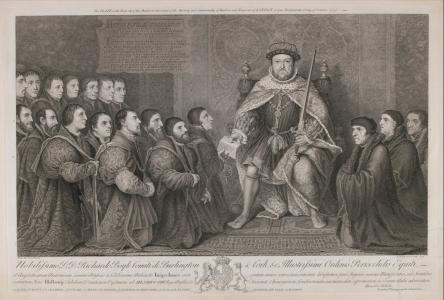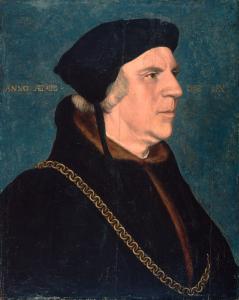Biography of William Butts 1486-1545
Around 1486 William Butts was born.
Letters and Papers 1528. 23 Jun 1528. 4409. When I came to that part of your letter mentioning your counsel to the King for avoiding infection he thanked your Grace, and showed the manner of the infection; how folks were taken; how little danger there was if good order be observed; how few were dead of it; how Mistress Ann (Boleyn) (age 27) and my Lord Rochford (age 25) both have had it; what jeopardy they have been in by the turning in of the sweat before the time; of the endeavor of Mr. Buttes (age 42), who hath been with them in his return; and finally of their perfect recovery. He begs you will keep out of infection, and that you will use small suppers, drink little wine, "namely, that is big," and once in the week use the pills of Rasis; and if it come, to sweat moderately, and at the full time, without suffering it to run in, &c.
 Around 1543. Hans Holbein The Younger (age 46). Henry VIII Presenting a Charter to the Barber Surgeons Company. The picture includes William Butts (age 57). See An Historical Account of Fulham Page 80.
Around 1543. Hans Holbein The Younger (age 46). Henry VIII Presenting a Charter to the Barber Surgeons Company. The picture includes William Butts (age 57). See An Historical Account of Fulham Page 80.
 Around 1543. Hans Holbein The Younger (age 46). Portrait of William Butts (age 57).
Around 1543. Hans Holbein The Younger (age 46). Portrait of William Butts (age 57).
On 17 Nov 1545 William Butts (age 59) died. He was buried at All Saints Church, Fulham. Note. Some sources state his death being on 22 November which is inconsistent with the inscription on his monument - see An Historical Account of Fulham.
Life of Cardinal Wolsey. At Christmas he fell sore sick, that he was likely to die. Whereof the king being advertised, was very sorry therefore, and sent Doctor Buttes, his grace's physician, unto him, to see in what estate he was. Doctor Buttes came unto him, and finding him very sick lying in his bed; and perceiving the danger he was in repaired again unto the king. Of whom the king demanded, saying, "How doth yonder man, have you seen him?" "Yea, sir," quoth he."How do you like him?" quoth the king. "Forsooth, sir," quoth he, "if you will have him dead, I warrant your grace he will be dead within these four days, if he receive no comfort from you shortly, and Mistress Anne." "Marry," quoth the king, "God forbid that he should die. I pray you, good Master Buttes, go again unto him, and do your cure upon him; for I would not lose him for twenty thousand pounds." "Then must your grace," quoth Master Buttes, "send him first some comfortable message, as shortly as is possible." "Even so will I," quoth the king, "by you. And therefore make speed to him again, and ye shall deliver him from me this ring for a token of our good will and favour towards him, (in the which ring was engraved the king's visage within a ruby, as lively counterfeit as was possible to be devised). This ring he knoweth very well; for he gave me the same; and tell him, that I am not offended with him in my heart nothing at all, and that shall he perceive, and God send him life, very shortly. Therefore bid him be of good cheer, and pluck up his heart, and take no despair. And I charge you come not from him, until ye have brought him out of all danger of death." And then spake he to Mistress Anne, saying, "Good sweetheart, I pray you at this my instance, as ye love us, to send the cardinal a token with comfortable words; and in so doing ye shall do us a loving pleasure." She being not minded to disobey the king's earnest request, whatsoever she intended in her heart towards the cardinal; took incontinent her tablet of gold hanging at her girdle, and delivered it to Master Buttes, with very gentle and comfortable words and commendations to the cardinal. And thus Master Buttes departed, and made speedy return to Asher, to my Lord Cardinal; after whom the king sent Doctor Clement, Doctor Wotton, and Doctor Cromer the Scot, to consult and assist Master Buttes for my lord's health.
After that Master Buttes had been with my lord, and delivered the king's and Mistress Anne's tokens unto him, with the most comfortable words he could devise on their behalf, whereat he rejoiced not a little, advancing him a little in his bed, and received their tokens most joyfully, thanking Master Buttes for his comfortable news and pains. Master Buttes showed him furthermore, that the king's pleasure was, that he should minister unto him for his health: and to join with him for the better and most assured and brief ways, to be had for the same, hath sent Doctor Wotton, Doctor Clement, and Doctor Cromer, to join with him in counsel and ministration. "Therefore, my lord," quoth he, "it were well done that they should be called in to visit your person and estate, wherein I would be glad to hear their opinions, trusting in Almighty God that, through his grace and assistance, we shall ease you of your pains, and rid you clean from your disease and infirmity." Wherewith my lord was well pleased and contented to hear their judgments; for indeed he trusted more to the Scottish doctor than he did to any of the other, because he was the very occasion that he inhabited here in England, and before he gave him partly his exhibition in Paris. Then when they were come into his chamber, and had talked with him, he took upon him to debate his disease learnedly among them, so that they might understand that he was seen in that art. After they had taken order for ministration, it was not long or they brought him out of all danger and fear of death; and within four days they set him on his feet, and got him a good stomach to his meat7. This done, and he in a good estate of amendment, they took their leave to depart, to whom my lord offered his reward; the which they refused, saying, that the king gave them in special commandment, to take nothing of him for their pains and ministration; for at their return his highness said that he would reward them of his own costs: and thus with great thanks they departed from my lord, whom they left in good estate of recovery.
Note 7. In an extract from a letter to Cromwell, published by Fiddes, the cardinal says: "My fever is somewhat asswaged, and the black humour also, howbeit I am entering into the kalends of a more dangerous disease, which is the dropsy, so that if I am not removed into a dryer air, and that shortly, there is little hope." And in a letter to Gardiner, which will be found in the Appendix, he repeats his wish to be removed from Asher: "Continuing in this moiste and corrupt ayer, beyng enteryd in the passion of the dropsy, Appetitus et continuo insomnio, I cannot lyve: wherfor of necessyte I must be removed to some dryer ayer and place."
An Historical Account of Fulham Chapter III. Beneath the monument of Sir Thomas Smith, and touching the steps of the altar, is an altar monument of English marble, close against the south wall, the head of it adjoining the entrance into the south chapel parallel to the chancel, under which is entombed Sir William Butts, Knight, Chief Physician to Henry VIII. It originally had his portraiture in brass, in armour as a knight, and his arms — "Az. 3 Lozenges Gules, on a Chevron Or, between 3 etoils Or," at the four corners of the stone. There was also a scroll of brass on one side of him inscribed Myn Advantage." On the wall just above it, is put up a later inscription on a neat marble tablet, by Leonard Butts, of Norfolk, Esq., one of his descendants.1
Epitaphiu D. Gulielmi Butij Equitis aurati
Et medici regis Henrici Octavi qui
Obiit AO Dni 1545. 170 Novemb.
Quid medicina valet, quid honos, quid gratia Regum
Quid Popularis amor, mors ubi sæva venit ?
Sola valet pietas quæ structa est auspice Christo
Sola in morte valet, cætera cuncta fluunt.
Ergo mihi in vita fuerit quando omnia Chrisius,
Mors mihi nunc lucrum, vitaque Christus erit.
Epitaphiu hoc primitös inscriptum pariete et
Situ jam pene exesum sic demum restituit.
Leonardus Butts Armiger Norfolciensis.
Oct. 30. 1627.
Amoris FAO.
Physic, or honour, flatt'ry, wealth, or pow'r,
To man of what Avail in death's dread hour ;
Then Christian Piety alone can save,
Our only firm assistance in the grave.
Since Christ in life has been Iny only joy,
Death will bring happiness without alloy.
The verses are supposed to have been written by Sir John Cheke, the intimate friend of Dr. Butts--• And what if I •should think," says Strype, that this was the issue of Cheke's pious fancy in his last respects to this man, for which he had so high and deserved a veneration.2
Sir William Butts, Doctor of Physic, was a native of Norfolk, and received his education at Caius College, Cambridge. He afterwards was made Domestic Physician to Henry VI ll., and received the honour of knighthood from that monarch.3 He was one of the founders of the College of Physicians, in whose records he is highly extolled for learning and knowledge, as well as for his singular judgment and great experience. He appears to have been highly in favour with the King, as well as much respected by many eminent persons at Court; and has been celebrated by some of the literary persons of his age; particularly Bishop Parkhurst, who has some epiorams on him.4 Dr. Butts married Margaret, daughter and heiress of Bacon, of Cambridgeshire, by whom he had three sons, William, who was knighted, and resided at Thornage in Norfolk, and who died in 1583 Thomas, who settled at Great Riburgh in Norfolk5, where his ancient seat is now remaining in the possession of Sir Edmund Bacon; and Edmund, of Barrow, in Suffolk. These married three sisters, daughters and co-heiresses of Henry Bures of Acton in Suffolk, by Ann, daughter of Sir William Walgrave, which lady married to her second husband Sir Clement Higham, Chief Baron of the Exchequer. This gave rise to an error in a pedigree of the Bacon family in, "Blomefield's Norfolk," where Sir William Bugs is stated to have married a daughter of Sir Clement Higham. Of the sons, Edmund alone had daughter, who became sole heiress to her uncles, married Sir Nicholas Bacon. 
Sir William Butts died 17th November 1545, and was buried in this church. It is probable that some part of his family at that time resided here, as the name of Butts, at a later period, occurs in the parish books. His name is immortalised in the pages of Shakespeare, who has introduced him in his "Play of Henry VIII," as forming one of the household of that monarch6. Holbein has inserted his portrait in "The Delivery of the Charter to the Barber Surgeons Company," which has been engraved by Baron.
Note 1. Cole's MSS. Brit. Mus. vol. xxx.
Note 2. Strype's Life of Cheke, p. 24. 8vo., 1712.
Note 3. Ibid. p. 32.
Note 4. A. Wood. Athen. Oxon.
Note 5. See a "Boke of Epitaphs" on his death, printed by Robert Dallington and others.
Note 7. Hen. VIII. Act V. Scene II.
[his son] Edmund Butts was born to William Butts.